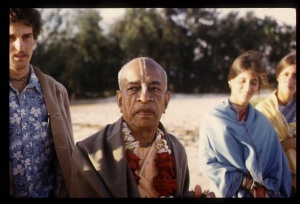CC Madhya 8.310 (1975): Difference between revisions
(Vanibot #0027: CCMirror - Mirror CC's 1996 edition to form a basis for 1975) |
(Vanibot #0020: VersionCompareLinker - added a link to the Version Compare feature) |
||
| Line 2: | Line 2: | ||
<div style="float:left">'''[[Sri Caitanya-caritamrta (1975)|Śrī Caitanya-caritāmṛta (1975)]] - [[CC Madhya (1975)|Madhya-līlā]] - [[CC Madhya 8 (1975)|Chapter 8: Talks Between Śrī Caitanya Mahāprabhu and Rāmānanda Rāya]]'''</div> | <div style="float:left">'''[[Sri Caitanya-caritamrta (1975)|Śrī Caitanya-caritāmṛta (1975)]] - [[CC Madhya (1975)|Madhya-līlā]] - [[CC Madhya 8 (1975)|Chapter 8: Talks Between Śrī Caitanya Mahāprabhu and Rāmānanda Rāya]]'''</div> | ||
<div style="float:right">[[File:Go-previous.png|link=CC Madhya 8.309 (1975)|Madhya-līlā 8.309]] '''[[CC Madhya 8.309 (1975)|Madhya-līlā 8.309]] - [[CC Madhya 8.311 (1975)|Madhya-līlā 8.311]]''' [[File:Go-next.png|link=CC Madhya 8.311 (1975)|Madhya-līlā 8.311]]</div> | <div style="float:right">[[File:Go-previous.png|link=CC Madhya 8.309 (1975)|Madhya-līlā 8.309]] '''[[CC Madhya 8.309 (1975)|Madhya-līlā 8.309]] - [[CC Madhya 8.311 (1975)|Madhya-līlā 8.311]]''' [[File:Go-next.png|link=CC Madhya 8.311 (1975)|Madhya-līlā 8.311]]</div> | ||
{{CompareVersions|CC|Madhya 8.310|CC 1975|CC 1996}} | |||
{{RandomImage}} | {{RandomImage}} | ||
==== TEXT 310 ==== | ==== TEXT 310 ==== | ||
| Line 41: | Line 40: | ||
And according to the Brahma-sūtra (2.1.11), tarkāpratiṣṭhānāt. | And according to the Brahma-sūtra (2.1.11), tarkāpratiṣṭhānāt. | ||
All Vedic | All Vedic scriptures declare that transcendental subjects cannot be understood simply by argument or logic. Spiritual matters are far above experimental knowledge. Only by Kṛṣṇa's mercy can one who is interested in His transcendental loving affairs understand them. If one tries to understand these transcendental topics simply by using one's material brain substance, the attempt will be futile. Whether one is a prākṛta-sahajiyā or a mundane opportunist or scholar, one's labor to understand these topics by mundane means will ultimately be frustrated. One therefore has to give up all mundane attempts and try to become a pure devotee of Lord Viṣṇu. When a devotee follows the regulative principles, the truth of these talks will be revealed to him. This is confirmed in the Bhakti-rasāmṛta-sindhu (1.2.234): | ||
:ataḥ śrī-kṛṣṇa-nāmādi na bhaved grāhyam indriyaiḥ | :ataḥ śrī-kṛṣṇa-nāmādi | ||
:sevonmukhe hi jihvādau svayam eva sphuraty adaḥ | :na bhaved grāhyam indriyaiḥ | ||
:sevonmukhe hi jihvādau | |||
:svayam eva sphuraty adaḥ | |||
One cannot understand the | One cannot understand the Lord's holy name, pastimes, form, qualities, or entourage with one's blunt material senses. However, when the senses are purified by the constant rendering of service, the spiritual truth of the pastimes of Rādhā and Kṛṣṇa are revealed. As confirmed in the Muṇḍaka Upaniṣad: yam evaiṣa vṛṇute tena labhyas. Only one who is favored by the Supreme Personality of Godhead can understand the transcendental features of Śrī Caitanya Mahāprabhu. | ||
</div> | </div> | ||
Latest revision as of 20:16, 27 January 2020

A.C. Bhaktivedanta Swami Prabhupada
TEXT 310
- śrī-caitanya-nityānanda-advaita-caraṇa
- yāṅhāra sarvasva, tāṅre mile ei dhana
SYNONYMS
śrī-caitanya—of Lord Śrī Caitanya Mahāprabhu; nityānanda—of Lord Nityānanda; advaita-caraṇa—and the lotus feet of Śrī Advaita Prabhu; yāṅhāra sarva-sva—whose everything; tāṅre—him; mile—meets; ei—this; dhana—treasure.
TRANSLATION
He who has accepted as everything the lotus feet of Śrī Caitanya Mahāprabhu, Nityānanda Prabhu and Advaita Prabhu can attain this transcendental treasure.
PURPORT
Śrī Bhaktisiddhānta Sarasvatī Ṭhākura says that Kṛṣṇa is obtainable for the faithful, but for those who are accustomed to argue, Kṛṣṇa is far, far away. Similarly, these talks between Rāmānanda Rāya and Śrī Caitanya Mahāprabhu can be understood by a person who has firm faith. Those who are not in the disciplic succession, the asauta-panthīs, cannot have faith in these talks. They are always doubting and engaging in mental concoctions. These talks cannot be understood by such whimsical people. Transcendental topics remain far, far away from those engaged in mundane arguments. In this regard, the Vedic mantras in the Kaṭha Upaniṣad (1.2.9) state, naiṣā tarkeṇa matir āpaneyā proktānyenaiva su-jñānāya preṣṭha. According to the Muṇḍaka Upaniṣad (3.2.3):
- nāyam ātmā pravacanena labhyo
- na medhayā na bahunā śrutena
- yam evaiṣa vṛṇute tena labhyas
- tasyaiṣa ātmā vivṛṇute tanūṁ svām
And according to the Brahma-sūtra (2.1.11), tarkāpratiṣṭhānāt.
All Vedic scriptures declare that transcendental subjects cannot be understood simply by argument or logic. Spiritual matters are far above experimental knowledge. Only by Kṛṣṇa's mercy can one who is interested in His transcendental loving affairs understand them. If one tries to understand these transcendental topics simply by using one's material brain substance, the attempt will be futile. Whether one is a prākṛta-sahajiyā or a mundane opportunist or scholar, one's labor to understand these topics by mundane means will ultimately be frustrated. One therefore has to give up all mundane attempts and try to become a pure devotee of Lord Viṣṇu. When a devotee follows the regulative principles, the truth of these talks will be revealed to him. This is confirmed in the Bhakti-rasāmṛta-sindhu (1.2.234):
- ataḥ śrī-kṛṣṇa-nāmādi
- na bhaved grāhyam indriyaiḥ
- sevonmukhe hi jihvādau
- svayam eva sphuraty adaḥ
One cannot understand the Lord's holy name, pastimes, form, qualities, or entourage with one's blunt material senses. However, when the senses are purified by the constant rendering of service, the spiritual truth of the pastimes of Rādhā and Kṛṣṇa are revealed. As confirmed in the Muṇḍaka Upaniṣad: yam evaiṣa vṛṇute tena labhyas. Only one who is favored by the Supreme Personality of Godhead can understand the transcendental features of Śrī Caitanya Mahāprabhu.